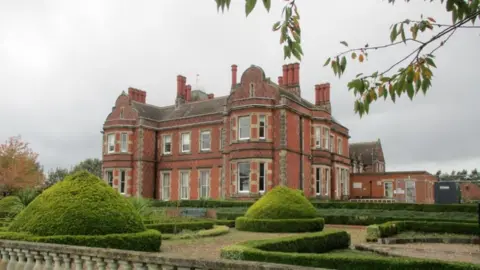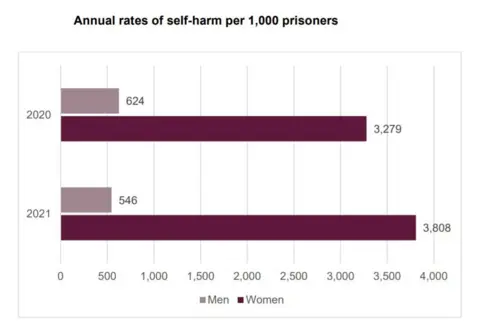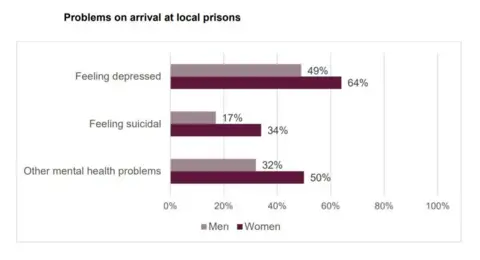Foston Hall: Female prisoners self-harmed 1,750 times in one year
 HM Inspectorate of Prisons
HM Inspectorate of PrisonsSerious concerns have been raised about levels of self-harm at a women's prison, which has been given the lowest possible safety rating.
Foston Hall in Derbyshire is the first women's prison to be given a "poor" rating for safety by inspectors.
There were 1,750 incidents of self-harm over one year, and prisoners made about 1,000 calls to Samaritans each month.
Prisons Minister Victoria Atkins said a "new safety team" had been created to address issues at the prison.
'Concerns across women's prison estate'
The issues were highlighted in a report published following an unannounced inspection by the chief inspector of prisons, Charlie Taylor.
This report was published alongside a separate briefing paper on inspections of five women's prisons, which HM Inspectorate of Prisons said raised "serious concerns about high rates of self-harm and vulnerability across the women's prison estate".
Levels of self-harm at Foston Hall were the highest out of all women's prisons, and two women there had killed themselves since 2019.
Explaining his concerns, Mr Taylor said: "Neither the prison's assessment of vulnerability, nor the support offered to newly-arrived women were good enough.
"The response to women in crisis was too reactive, uncaring and often punitive. It was no surprise that in our survey nearly a third of women told us they felt unsafe."
The report said there had been a deterioration in the daily regime at the prison since the Covid-19 pandemic.
"The unpredictability of the regime was contributing to tensions on the wings and, we suspected, increased violence, particularly against staff," Mr Taylor said.
 HM Inspectorate of Prisons
HM Inspectorate of PrisonsFoston Hall had 272 residents at the time of the inspection, in October and November 2021.
The report said a small group of about 10 women "harmed themselves frequently", and a much larger group of about 120 women "harmed themselves less often" but still accounted for more than 500 incidents over the previous year.
The report highlighted how messages left on the prison's crisis hotline - which was for families to call if they had concerns about a relative - had not been checked for six weeks at the time of inspection.
In a survey by HM Inspectorate of Prisons, 63% of women said they had thought about harming themselves while at Foston Hall, but only a third of this group said they felt cared for by staff.
Prisoners had also not had access to prisoners trained by Samaritans, known as "Listeners", since March 2020. The report said this was because the scheme had been suspended at the start of the pandemic and the only trained Listener who remained in the prison "no longer felt skilled enough to deliver the service".
However, the report said new volunteers were due to start training as Listeners shortly after the inspection.
 HM Inspectorate of Prisons
HM Inspectorate of PrisonsThe vast majority of prisoners in England and Wales are male, with women accounting for only about 4% - 3,129 out of the total 74,994, as of September 2021.
The briefing paper on the inspection of the five prisons says "many women in prison are vulnerable", highlighting their higher rates of depression, suicidal thoughts and other mental health problems compared to men.
"Some women end up in prison due to a lack of mental health provision elsewhere, but nobody knows the full extent of this problem," the report says.
"Some warrants authorising imprisonment clearly state that a prison is being used as a 'place of safety'.
"Nobody would agree that prisons are the right place to keep women who are acutely unwell."
'Problems made worse in custody'
The Prison Reform Trust said female offenders should be given "proper treatment and support in the community" as an alternative to custody.
"A large number of women in prison are victims of far more serious crimes than those for which they have been convicted," said Emily Evison, women's policy officer at the Prison Reform Trust.
"Women's prisons are expected to solve problems which are made worse by women being in custody. Nearly three-quarters - 72% - of women entering prison to serve a sentence have committed a non-violent offence. Many women who offend suffer from drug and alcohol addictions and mental ill health."
'Designed for men'
Both the Prison Reform Trust and Howard League for Penal Reform said the government should abandon plans to build 500 more women's prison places.
Andrea Coomber, chief executive of the Howard League for Penal Reform, said: "This shocking report on the appalling lack of care and support in Foston Hall prison ought to be a turning point for the government's approach to women in trouble.
"Such a horrifying account of extreme mental distress and self-harm makes clear why ministers should abandon their plans to build 500 more prison places and return instead to the strategy the government published in 2018, focused on keeping women out of a failing system that is designed for men."
Prisons Minister Victoria Atkins said: "While we needed to take decisive action to protect prisoners and staff during the pandemic, the issues highlighted by the inspection at HMP Foston Hall are not acceptable and we have put in place more senior staff and created a new safety team to address them rapidly.
"Across the wider women's prison estate, our staff have worked hard to ensure women receive extra support to deal with mental health issues during the pandemic, overseen by a taskforce at national level, and we are starting to see a decrease in the number of self-harm incidents across the estate."
If you have been affected by the issues raised in this story, you can contact the BBC Action Line.

Follow BBC East Midlands on Facebook, Twitter, or Instagram. Send your story ideas to [email protected].
